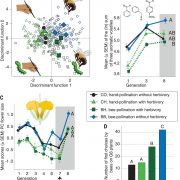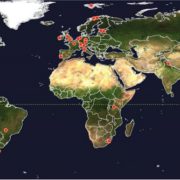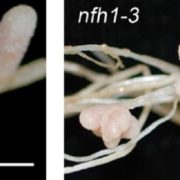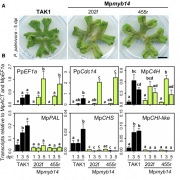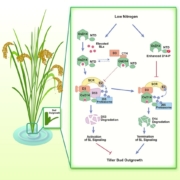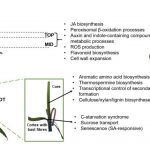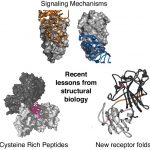Single-cell genomics unveils an ectosymbiont cyanobacteria associated with a dinoflagellate host (PNAS)
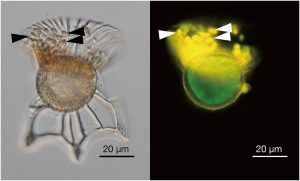 Cyanobacteria are important contributors to global carbon fixation. They can be free-living in many different environments, but also form close symbiotic associations with various eukaryotic organisms. Nakayama et al. have idea identified a new type of cyanobacteria that lives as an ectosymbiont in a specialized extracellular chamber of a marine dinoflagellate. This new cyanobacterium, which the authors refer to as OmCym (after the host, Ornithocercus magnificus), has a greatly reduced genome. Genes involved in membrane transport have been preferentially lost, perhaps due to the relatively stable environment provided by the host. Given that the cyanobacteria can be found in ingested food vacuoles, they may be considered to have been ‘domesticated’ by their hosts as a food source. The authors speculate that these widespread cyanobacteria may have been overlooked previously because they are hidden within their hosts, and raise the possibility that there may be other similarly ‘hidden’ species. (Summary by Mary Williams) Proc. Natl. Acad. Sci USA 10.1073/pnas.1902538116
Cyanobacteria are important contributors to global carbon fixation. They can be free-living in many different environments, but also form close symbiotic associations with various eukaryotic organisms. Nakayama et al. have idea identified a new type of cyanobacteria that lives as an ectosymbiont in a specialized extracellular chamber of a marine dinoflagellate. This new cyanobacterium, which the authors refer to as OmCym (after the host, Ornithocercus magnificus), has a greatly reduced genome. Genes involved in membrane transport have been preferentially lost, perhaps due to the relatively stable environment provided by the host. Given that the cyanobacteria can be found in ingested food vacuoles, they may be considered to have been ‘domesticated’ by their hosts as a food source. The authors speculate that these widespread cyanobacteria may have been overlooked previously because they are hidden within their hosts, and raise the possibility that there may be other similarly ‘hidden’ species. (Summary by Mary Williams) Proc. Natl. Acad. Sci USA 10.1073/pnas.1902538116


